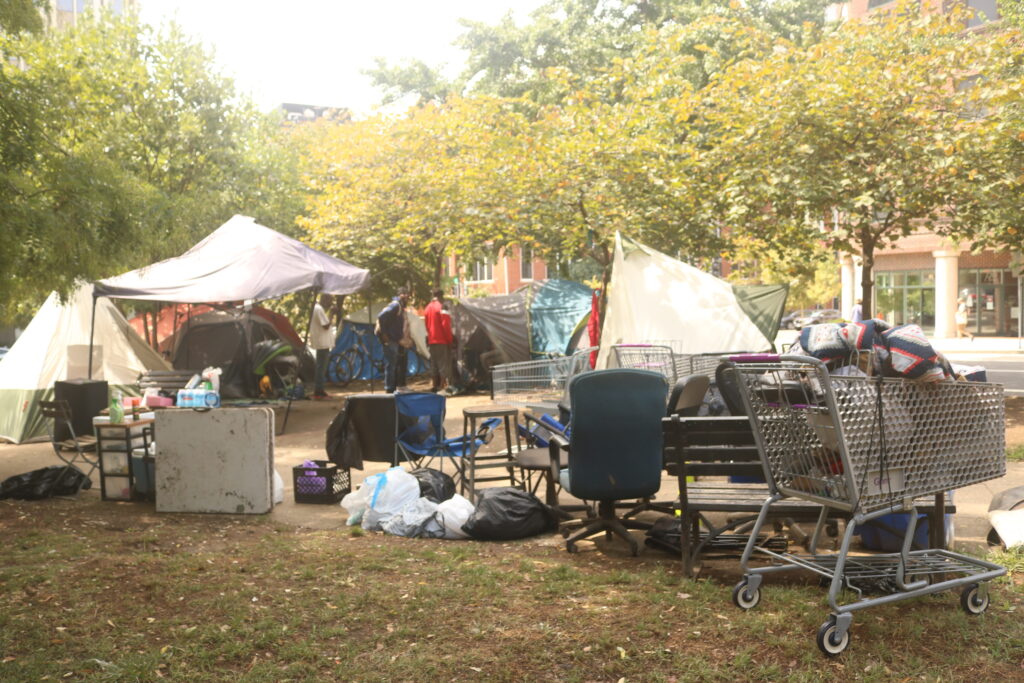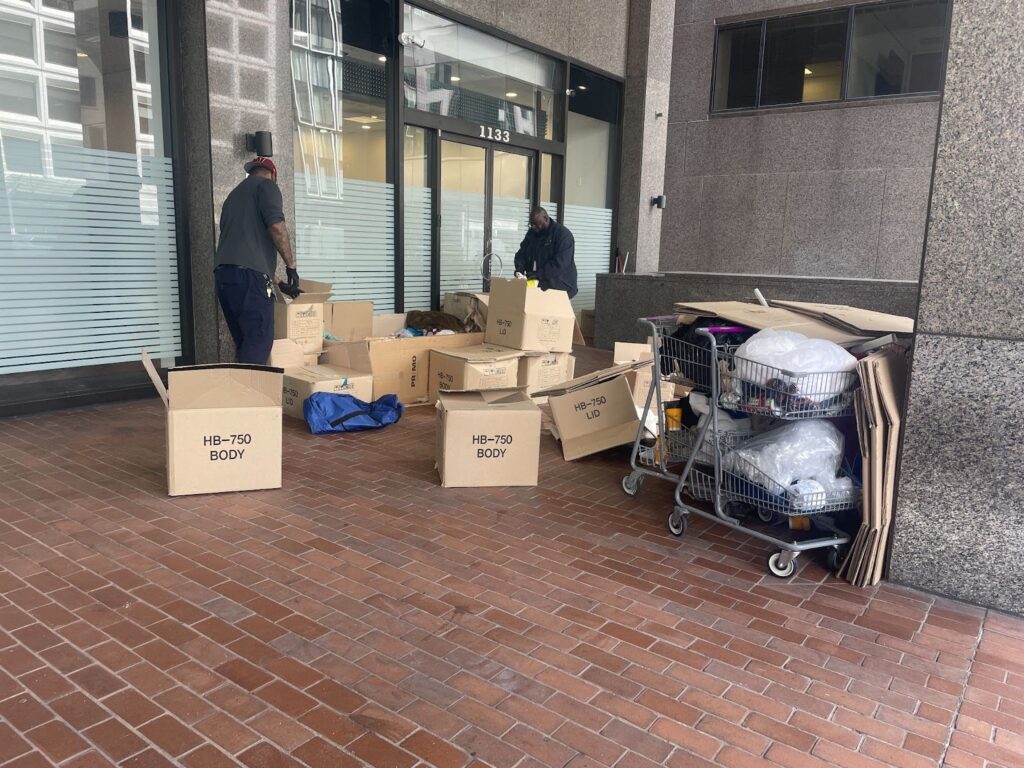For the 15 or so unhoused people who made a home at Burke Park, on 12th St. NW and Massachusetts Avenue, the area offered convenient access to necessities like laundry services, and the chance to be around people who understood their situation.
“It was like a piece of freedom,” said two-year Burke Park resident David, 40, who asked to be identified only by his first name. He said living out in the open, close to “Mother Nature,” was better than his experience living in the District’s troubled shelter system.
“It’s also [about] being around a lot of good people, people who can relate to the homelessness,” he said.
[Read more: Low-barrier shelter residents say staff abuse them amid ‘terrible’ conditions during COVID-19]
In addition to having a place to sleep and keep belongings — some of which would not be permitted at shelters — the residents enjoyed having barbecues and listening to music with friends. Tinsel and Christmas ornaments hung on the trees shading the tents.
But after a long summer of fighting evictions — at one point seemingly successfully — the residents of Burke Park and nearby Samuel Gompers Memorial Park had to say goodbye to their community on Sunday.
David said he now plans to live in different ATM vestibules until he is asked to leave.
The National Park Service, which manages the land, erected fencing at the park Monday. Park Police officers reminded the people living there of a closure scheduled for Wednesday, explaining the notice that had been posted there the previous week and providing copies upon request. One officer cited the upcoming return to school, noting that there had been stabbings and drug use in the park, as a reason for the closure. She also cited rodent infestation and damage to tree trunks.

The day the fences were put up, personnel from the DowntownDC business improvement district “worked in partnership with the D.C. Department of Human Services (DHS) to assist in the removal of items that people willingly discarded,” a BID spokesperson told Street Sense Media in an email. They said the BID, DHS, and outreach workers from Pathways to Housing D.C. would similarly be on site Wednesday to help during the NPS closure.
Aaron Howe, who co-leads the mutual aid group Remora House, said in a tweet that BID workers also threw away tents that residents intended to keep that day. The BID spokesperson disputed this allegation.
“Our goodness is defined by our compassion, and there’s a distinct lack of compassion here,” said Alexandra Bailey, a commissioner of Advisory Neighborhood Commission 2F08, which includes Burke Park. A vocal advocate for residents opposing the eviction, she organized volunteers to come out on Sunday and help residents pack their belongings.
Around 15 volunteers worked alongside residents to pile up chairs, grills, and other furniture too large to easily move. Nearly two hours after organizers arrived, possessions filled several donated suitcases and carts. Nearby garbage cans overflowed with rugs, tarps, and anything that couldn’t be donated to mutual aid groups.
[Read more: Unhoused residents unite with local ANCs to prevent eviction]
Plans to clear the encampment may have been sparked by a letter sent by nearby housed residents at the end of June, which detailed complaints about public health and safety. Bailey said she received word that the Park Police was planning to evict the community around July 4. But amid lobbying from local activist groups and ANC members, NPS reversed course, saying in mid-July that it had “no imminent plans to remove existing encampments” and would first take “a social services first approach” to connecting residents with housing and other resources.
Bailey said an event she helped organize last month to get residents into housing made progress, but the residents need more time to find stable homes and obtain everything necessary to do so, such as ID.
She alleges that, while D.C. agencies have also been working to that end, Ward 2 Councilmember Brooke Pinto has not been responsive to requests to intervene
“D.C. agencies have been doing the most,” Bailey said. “My councilmember is not letting us finish.”
Pinto, who did not reply to an immediate request for comment, denied that she could have altered the federal agency’s eviction plans in a statement posted to Twitter and said the park was being closed because of “reports of violence and criminal activity.”
Pinto added that the Office of the Deputy Mayor for Health and Human Services “is working to move those in the park into transitional housing while permanent housing is arranged.”\

When asked how many people from the two parks had moved into transitional housing, the deputy mayor’s office said it could not “confirm the housing status of specific residents” due to privacy protections under the Homeless Services Reform Act. When pressed for an aggregate number of how many people from the two parks had been matched to transitional housing, the office responded with a statement from deputy mayor Wayne Turnage that did not provide any data.
In full: “D.C. has a right to shelter and living on the street is no way to treat the residents who need us most. The Office of the Deputy Mayor for Health and Human Services (DMHHS) continues to engage and connect individuals experiencing homelessness to resources such as shelter, housing, and access to behavioral services. As you may know, Burke and Gomper Park are National Parks Services land. Although DMHHS did not coordinate this park closure, our encampment outreach team informed residents of the upcoming closure. We will continue to encourage all encamped residents to utilize shelter and seek services.”
The deputy mayor’s office has conducted 21 “full cleanups” of encampments on D.C. land so far in 2021, with two more scheduled for this month, according to Street Sense Media’s tracking of the office’s calendar.
The Burke and Gompers encampment cleanup is the latest action by the National Park Service, which has jurisdiction over more than 6,700 acres of NPS parklands scattered throughout the city. At least one other federal park where people had been encamped was fenced off at the end of July at 2nd and D Streets NE.
Advocates argue that breaking up encampments delays the housing process further, as unhoused residents risk losing key documents and access to a housing advocate during the move.
“We’ve started folks in the pipeline to get housing and to get vouchers,” said Rehana Mohammed, the ANC 2F07 commissioner, who helped residents pack up their belongings on Sunday. “And when they move, they might have to start all over in a new place.”
Bailey worries that it will leave more people to the same fate as Robert Buchanan. Dubbed the “governor” of the Burke Park community, Buchanan received a voucher for housing from the D.C. government, but he has not been able to move into a unit because he lost some of the identifying documents required, she says.

Buchanan has been at Burke Park for more than six months. He now plans to move to the encampment at 20th and E streets. (Bailey said she recommended that residents move there because it will be easier for them to access mutual aid and support.)
His main concern is proximity to a laundromat, which he relies on to stay clean. The Downtown Day Service Center and the Georgetown Ministry Center — more than a mile away from 20th and E streets — are the nearest facilities for showers and laundry. (The advisory neighborhood commission that represents that portion of Foggy Bottom passed a resolution calling for D.C. Council to fund mobile sanitation facilities to serve the long-standing encampment, but it’s not clear when or if they would be installed)
The 65-year-old said this eviction is just another one he has had to overcome in his decades of not having a home: “I’m going to survive,” he said.
There were only a handful of tents in the parks Tuesday morning, according to reporting by WTOP.
Advocates argue, however, that these evictions didn’t need to happen.
Constituents have raised concerns about unhoused people going to the bathroom, but the eviction threats earlier in the summer actually delayed officials in relocating a portable toilet from a nearby Safeway, according to Bailey.
“All the constant eviction threats made it so the D.C. government didn’t do it,” she said. “There were solutions that could have been had here.”
Tanisha Hall, who moved her belongings to a different location before other Burke Park residents, said she was worried about people finding a new place to set up. It’s difficult, Hall said, to sleep in front of businesses without knowing the owners.
“You have to talk to the people that own the business and stuff, so you have to really talk to them and let them know that you want to stay there,” she explained.
[Read more: Encampment cleanup at 7th and P St NW bus shelter sparks debate over public space]
Recent legislation to increase the number of housing vouchers is a start, advocates said. Subject to final approval by the mayor and Congress, the bill is slated to raise taxes to fund 1,267 permanent supportive housing vouchers. But the city’s elected officials need to do more to ensure that every resident gets housing, several ANC commissioners said.
Meghan Faulkner, commissioner of ANC 1C04, who volunteered to help residents pack, pointed to reports that the D.C. government left hundreds of housing vouchers undistributed last year.
“The really shameful part is if we are funding this, we should be going all out to make sure that we are not leaving money on the table,” Faulkner said, “because there are people in encampments, there are people in shelters, there are people who are doubled up and in crowded living conditions who are waiting.”








